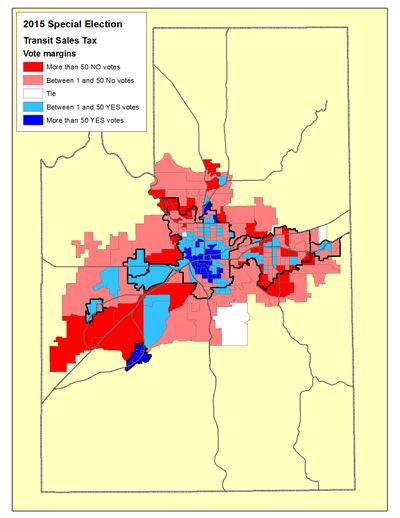STA transit sales tax increase fails

Late returns counted Wednesday failed to give Spokane Transit Authority’s Proposition 1 ballot measure enough votes to overcome an election night deficit.
With less than 1,000 votes remaining to be counted, the chance of the measure passing is “almost impossible,” Spokane County Auditor Vicky Dalton said.
“Yes” votes narrowed the gap in the latest count on Wednesday afternoon. The gap went from 863 to 681 votes, but still on the side of rejection.
The percentages stood at 49.6 percent in favor compared with 50.4 percent against the sales tax increase.
County officials estimated that there are 800 to 1,000 votes uncounted, including about 500 ballots not counted because voters failed to sign their ballot return envelopes as required. Those voters will be receiving letters from the county giving them until May 11 to validate their ballots, which remain unopened, officials said.
Dalton said she does not expect a substantial number of additional ballots arriving by mail that were postmarked by the deadline on Tuesday. Typically, the bulk of ballots are received by the Wednesday after an election, she said.
STA was seeking a 0.3 percent increase in the local sales tax to pay for a major expansion of mass transit as well as to improve and modernize the existing system that is operating with many aging buses.
The measure included a $72 million construction plan for an electric trolley bus line running from Browne’s Addition to Spokane Community College through downtown and Gonzaga University. A $57 million federal grant would be available for the project if voters agreed to pay the remaining share.
Proposition 1 called for transit improvements across the STA service area, including new park-and-ride facilities, better night and weekend service, and improved cross-town routes.
Spokane City Councilman Jon Snyder, a supporter of transit expansion, said he is not giving up on getting voter approval. He said city voters supported the measure so strongly that he feels committed to continuing the drive toward better transit.
“It really wasn’t close in the city of Spokane,” he said, estimating that the Spokane city vote was 55 percent in favor. “We have got to look at going out again or doing things a little differently.”
Snyder said it is not right that voters living in outlying housing districts and Spokane Valley should control transit policy inside Spokane when transit enjoys such strong support there.
County Commissioner Al French, a member of the STA board and a supporter of the measure, said he has not given up on overcoming the deficit.
An analysis of the count through Wednesday showed the strongest support for the measure in the cities of Spokane, Cheney, Airway Heights and Medical Lake, but widespread opposition in Spokane Valley and suburban areas ringing the cities.
Improvements sought for the West Plains, including a proposed transit center at the Medical Lake interchange on Interstate 90, may have helped win support in that part of Spokane’s Public Transit Benefit Area, Snyder said. In addition, those areas are vulnerable to future cuts, he said.
Cheney and the heart of Spokane, including a wide swath of the South Hill, rang up the most “yes” votes, according to a map analysis.
The strongest opposition was in newer neighborhoods farther from the core, including Indian Trail, Wandermere, Five Mile bluff, Northwood, the South Pines area along state Highway 27 and other pockets of Spokane Valley.
Spokane Valley City Councilman Ed Pace, an STA board member, said voters were “trying to say enough is enough for our taxes.”
He said he supports STA programs but opposed putting Proposition 1 on the ballot. He said Spokane city residents should pay the bill if they want a Central City Line.
In addition, he said many residents living in his city often see buses that are running without many passengers so it is hard to convince them STA needs more funding.
The campaign in favor of the ballot measure raised about $123,000 in donations, according to the Public Disclosure Commission. There was no organized campaign against the measure.
Pace pointed out that opposition to Proposition 1 still held sway despite the well-funded campaign in favor of the increased transit sales tax.
Without a tax increase, STA officials have said service cuts are possible in about two years.